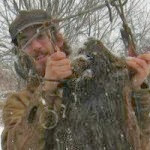HeritageWe are starting to make some progress on the new homestead. We are for the most part treating it as a separate business from the dairy that we run with my folks. I have for a long time been very interested in small scale, sustainable, direct market farming. We have made improvements on the dairy with grazing and such but still have to market our milk as a commodity. Our special product is worth no more than that of a 1500 cow factory. I would love to make cheese but we don't have the $80,000 to buy the stuff we would need to meet regulations. So the little bit of land that I have on top of the hill is where I can try out my ideas. I hope to build a business that can bring people and their food together. Something built on the idea of local economy and multigenerational stewardship. We have decided to call this operation Heritage Hill. The land is part of the original homestead settled by my wife's ancestors. It was cleared and settled in the 1700's from what I understand. While standing up there you can't help but think of the farmers, trappers and woodsman that roamed these hills and woods many years ago. The other night while I was working in the dirt with a hoe, watching the sunset, I couldn't help but wonder if this was were one of the first gardens was. Its a natural spot for one so I suppose its possible. Never the less, my children will have something that I never had; land that has 100's of years of family history.
Local HarvestThere is a neat site called
Local Harvest that puts food buyers in touch with local small farms. I was impressed with it. Type in your ZIP code and it gives you a list of farms and what they sell. It has a spot to click and email the farmers to ask questions and other nice features. The listings are free for the farms. It only took me a couple of minutes to set up my page. If you want to see it you can click
Here. I hope to be able to add more products to my listing as things progress. A lot of the berries and things I'm planting now will take a year or more to reach peak production.
Farm and SocietyIn Ricks latest post called
Joint stock companies , I found this paragraph to be very good.
"Now back to Weaver and Ideas Have Consequences.
His book is a withering critique of modern industrial thinking as contrasted with agrarianism, showing how the ills it has inflicted on society can be traced back to man's rejection in the 14th century of the idea of transcendence. And in the last three chapters of the book Weaver attempts to sketch a road back to sanity. One of his proposals is very agrarian, namely that society must center on the private ownership of small-scale farms. He has many reasons for thinking so, but one of the most striking is that Weaver thinks that the responsibility that comes with ownership is what connects a man with God's creation,the uncertainties, the constant attention, the blessings of bountiful yields, the testing that comes from unexpected disasters. This is stewardship, a God-given office that is rejected when the economy is restructured to center around the idea of passive investment, whether it be through absentee ownership of a farm or ownership of stock in a corporation."
I have always thought that farming has helped to make me a more faithful Christian. In the Industrial Info Tech World problems are solved through a chain of fallible men. There are dozens of places to go for help. If your problem is with a computer program, you can ask the expert at the office, then the company that sells it, then the guy who wrote it. When the pasture is dry and dead and we need rain, the only place to go for help is the God who makes the rain. Farmers spend a good deal of time on their knees. The farm reminds us, sometimes in a brutal way, that we are not in control. It also shows us that God answers prayers and feeds his people.



